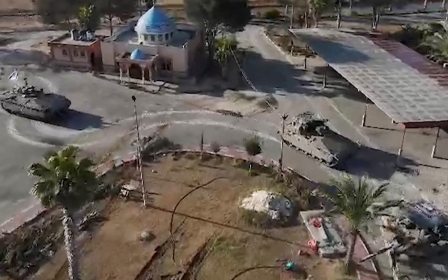Israel attacks Rafah, sparking anger after it rejected latest ceasefire proposal

Israeli forces launched an invasion of Rafah on Monday evening after Hamas made a surprise announcement saying it had accepted a ceasefire agreement that was proposed by Qatar and Egypt.
Israel's military quickly seized the Rafah border crossing linking Gaza with Egypt, with the UN warning of a collapse in the flow of aid as northern Gaza faces famine conditions. The attack comes despite longstanding international and US opposition to a full-scale invasion of the southern Gaza city.
The Israeli invasion took place despite ongoing negotiations for a ceasefire, as well as repeated statements from the administration of US President Joe Biden saying that it had yet to see a credible assessment of an Israeli operation that would minimise harm to the more than one million Palestinians in Rafah.
On Tuesday, White House National Security Council spokesperson John Kirby described the attack on Rafah as a "limited operation" and that it was not the full-scale invasion that Washington had warned Israel against.
The attack on Rafah and the Israeli rejection of the ceasefire accepted by Hamas, also comes days after the Biden administration had pressed the Palestinian armed group to accept the ceasefire deal.
New MEE newsletter: Jerusalem Dispatch
Sign up to get the latest insights and analysis on Israel-Palestine, alongside Turkey Unpacked and other MEE newsletters
“There’s no time for further haggling. The deal is there,” Blinken said on 1 May, further saying that Israel made “very important” compromises in ceasefire efforts and the ball was now in Hamas's court.
Blinken described the deal as "extraordinarily, extraordinarily generous on the part of Israel".
After Hamas accepted the ceasefire proposal on Monday, the United Nations and several countries in the region welcomed the decision and called on Israel to reciprocate and accept a cessation of the fighting.
Rather than welcoming the decision made by Hamas, the US said it would be reviewing the response by the Palestinian group.
"I don’t want to characterise the nature of that response just yet," State Department spokesperson Matt Miller said during a news briefing on Monday.
Israel blames US
Different accounts of the negotiations have emerged since Hamas's announcement on Monday accepting the deal, which Qatar had characterised on Monday as "positive".
The ceasefire proposal included an agreement that Hamas would release all remaining Israeli hostages in exchange for the release of Palestinians in Israeli detention.
The announcement from Hamas came after several days of negotiations between Hamas officials and Egyptian and Qatari mediators in Cairo and Doha, which were attended by CIA director William Burns, according to Axios.
Israel has meanwhile accused the US of not briefing it on the proposal agreed to by Hamas. Axios reported that Israeli officials say the deal agreed to by Hamas goes far beyond a proposal submitted by Israel at the end of April.
Israeli officials claimed that Washington knew about the changes made to Israel's proposal, but did not relay them to Israel prior to Hamas's announcement. The Axios report also states that "American diplomats have been engaged with Israeli counterparts. There have been no surprises."
The Associated Press reported on Monday that the draft that Hamas accepted had only "minor changes" and that the changes were made in consultation with CIA chief Burns.
Israel had not sent a delegation to negotiate with Qatari and Egyptian mediators over the weekend.
The Israeli prime minister's Office said on Monday that the proposal was "far from meeting Israel's core demands", adding that Israel would "dispatch a ranking delegation to Egypt to maximise the possibility of reaching an agreement on terms acceptable to Israel".
The Financial Times reported on Tuesday that Egypt is “angry” that Israel has refused to endorse a ceasefire deal accepted by Hamas, which Cairo initially introduced.
“The Egyptians are terrified [and they are] angry and exhausted with Israel,” the FT report said, citing an Israeli official familiar with the diplomatic talks between Tel Aviv and Cairo.
Middle East Eye delivers independent and unrivalled coverage and analysis of the Middle East, North Africa and beyond. To learn more about republishing this content and the associated fees, please fill out this form. More about MEE can be found here.





